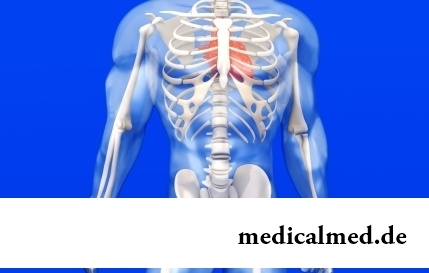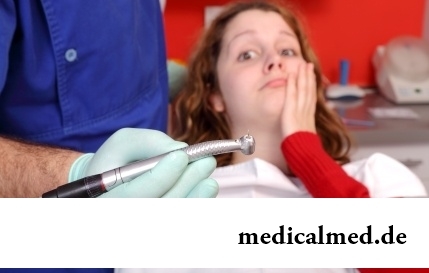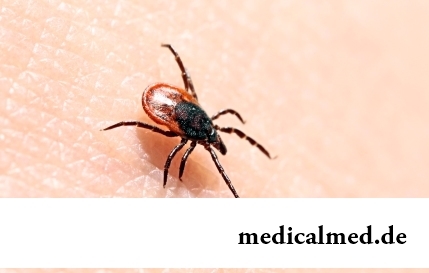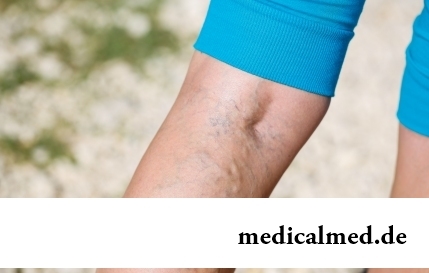





Infectiologist
The infectiologist is engaged in diagnosis, treatment and prevention of infectious diseases. As a rule, reception of the infectiologist takes place in infectious diseases hospital or in an office of infectious diseases.

The infectiologist is engaged in studying of emergence and mechanisms of development of infectious diseases, their clinical manifestations and develops ways of their treatment and prevention.
At children the children's infectiologist is engaged in diagnosis and treatment of infectious diseases. Flu, acute respiratory diseases, children's infections (chicken pox, a rubella, measles, epidemic parotitis), and also such serious infections as hepatitis, meningitis and diphtheria belong to the class of children's infectious diseases.
At what diseases it is worth getting advice of the infectiologist?
- Brucellosis;
- Rage;
- Typhoid;
- Viral hepatitis;
- Botulism;
- Chicken pox;
- Flu;
- Jaundice;
- The Omsk or Crimean hemorrhagic fever, hemorrhagic fever with a renal syndrome, etc.;
- Dysentery;
- Whooping cough;
- Measles;
- Iyersinioz;
- Diphtheria;
- Infectious mononucleosis (Filatov's disease);
- Rubella;
- Malaria;
- Malignant anthrax;
- Foot-and-mouth disease;
- Tick-borne encephalitis (spring and summer, taiga);
- Cholera;
- Plague;
- Scarlet fever;
- Ornithosis;
- Food toxicoinfections;
- Tularemia;
- Ugly face;
- ORZ;
- Leushmaniosis;
- KU fever;
- Measles;
- Meningococcal infection;
- Epidemic parotitis (mumps);
- Helminthoses;
- Acute intestinal infections;
- Sapropyra;
- Paratyphoid And yes Century.
When it is necessary to go for reception to the infectiologist?
- At various allocations from a neck of uterus, a vagina, an urethra of green, yellow, gray, white color, purulent or mucous character, with an unpleasant smell or without it, a liquid, curdled or foamy consistence;
- In case of burning and an itch in the field of generative organs;
- At painful feelings in a crotch or in an urethra;
- In case of an urodynia;
- At bloody allocations or bleedings of the obscure character from generative organs;
- At the speeded-up desires on an urination;
- At urine discoloration, emergence in it of flakes, blood, lumps and threads;
- In case of reddening, emergence of an attrition, warts, sores and bubbles in the field of generative organs or an anus.
Often symptoms of an infection are pains in the bottom of a stomach, in inguinal area, a waist, the crotches causing the increased body temperature.
Increase in regional lymph nodes also is a symptom of a venereal disease. If the person often changes sexual partners and does not use at the same time barrier methods of contraception, then he has to undergo regularly consultation at the infectiologist regarding infections, sexually transmitted.
When it is necessary to visit the children's infectiologist?
Existence of a headache at the child is quite frequent symptom of an infectious disease. Most often it is shown as a result of intoxication of an organism and arises against the background of fervescence, an ache in muscles, a fever and eye pain. Besides, existence of a headache can testify to such infection, terrible for the child, – meningococcal which is very dangerous and is capable to lead to a lethal outcome literally in several hours. Therefore it is extremely important to address the children's infectiologist in time.
One more common symptom of an infectious disease at the child is vomiting. As a rule, it meets at the diseases combined in the concept "acute abdomen" and demanding surgical intervention (peritonitis, an acute appendicitis, impassability of intestines, cholecystitis).
At infectious diseases vomiting can speak to the infectiologist about existence of intestinal infections, such as a salmonellosis, cholera, food toxicoinfection, dysentery, etc.
Rash is a frequent symptom of infectious diseases and demands urgent consultation from the infectiologist. As a rule, rash is followed by temperature increase and dangerous infectious diseases on which early diagnosis and treatment life of the little patient depends can be a symptom enough.
Diarrhea is also an infection symptom. Especially infectiologists should pay attention to it if its frequency exceeds 10 times a day, at the child appetite vanishes, at Calais there are blood impurity.
In the presence of blood in a chair at the child it is necessary to go urgently for reception to the infectiologist as it can be a symptom of such infectious diseases as an amebiasis, a balanthidiasis, dysentery.
What main diagnoses are carried out by the infectiologist?
The infectiologist can carry out the following diagnoses: electrocardiography, ultrasonography, irrigoskopiya, X-ray, rektoromanoskopiya, scanning of a liver, fibrokolonoskopiya.
Prevention of infectious diseases
To prevent infectious diseases, it is regularly necessary to hold anti-epidemic events, of which are main:
- Restriction of contacts with patients;
- Immunization;
- Increase in resilience of the person to infectious diseases;
- Chemoprophylaxis of infections: use of medicines with the purpose to prevent possible infection and reproduction of the activator.
Restriction of contacts, as a rule, comes down to isolation of sick persons. Each person has to remember that at emergence of the first symptoms of an infection he has to descend immediately on reception to the infectiologist, otherwise it does harm not only to own health, but also health of the people surrounding it.
The immunization which is carried out timely is very reliable method of prevention. It is carried out by introduction of the corresponding vaccine which is made from the weakened or killed microorganisms causing an easy form of a certain disease.
Chemoprophylaxis is carried out for the purpose of the prevention of some infectious diseases by use of himiopreparat or antibiotics. Prevention of reinfection can be an example at quinsy when after a rate of penicillin the patient enter Bicillinum-5 that prevents development of various complications.
It is not necessary to neglect also increase in body resistance to various infections. So, for example, strict observance of rules of personal hygiene, vitaminization, good nutrition, exercise stresses significantly increase resistance of an organism to some infections.
Prevention of children's infectious diseases is based on one principle: after the child had this or that infectious disease, it develops durable immunity to it further. On the basis of it children's infectiologists developed vaccines which allow to create durable immunity to certain diseases.
Vaccines against a rubella, measles, epidemic parotitis, hepatitis and many other diseases are already developed.
The most rare disease – a disease the Kura. Only representatives of the tribe Faure in New Guinea are ill it. The patient dies of laughter. It is considered that eating of a human brain is an origin of a disease.

The healthy nutrition is the invariable principle of health and good health for long years of the woman. Nevertheless, in рацио...
Section: Articles about health
The unpleasant feelings connected with spring breakdown are familiar almost to each of us. Often happens that in March-April on the person weakness leans: he suffers from drowsiness, complains of bad mood, loss of interest in life and failures in affairs....
Section: Articles about health
"Epilepsy" doctors made the diagnosis in antique times. Displays of an illness and pattern of its development are very well studied. However for nonspecialists this disease remains to not less mysterious, than in the ancient time. Many delusions are connected with epilepsy, and it sometimes very unpleasantly affects quality of life of patients and their relatives. In this article we will try to dispel the most known of similar myths....
Section: Articles about health
Any of us is not insured from a heavy illness of the loved one. Happens and so that someone from family members becomes lying бо...
Section: Articles about health
The stroke is one of the most widespread diseases of the person, annually in the world about 6 million cases of this pathology are registered. According to medical statistics, strokes occur almost three times more often than myocardial infarctions. Disease otno...
Section: Articles about health
For many women the word "fat" sounds as a sentence. In aspiration to an ideal figure they try to exclude, first of all, from the menu all dishes containing fats without having at the same time a clear idea of a role of these substances in exchange processes, and of effects for health with which food restrictions of this sort are fraught. For what the human body needs fats and as their deficit in a diet is shown, we also will try to find out....
Section: Articles about health
Venereal diseases in medicine are called the infections which are transmitted preferential sexually, now they are so...
Section: Articles about health
The naturopathy sometimes moves as the new direction of medicine, something like fashionable hobby, and there is nothing farther from the truth. This most ancient direction, the word "naturopathy" is translated as "treatment by the nature", and, no doubt, treatment приро...
Section: Articles about health
The chia plant, or the Spanish sage, is from South America. The indigenous people of the continent since ancient times used its seeds in food: small, but very nutritious kernels, in a form the reminding fasolina. Indians knew about useful properties of seeds of a chia, and applied them to maintenance of vitality and increase in endurance before serious exercise stresses....
Section: Articles about health
The phenomenon of improvement of a condition of the patients at administration of drugs who are not containing active agents, so-called effect of placebo is known...
Section: Articles about health
The hysteromyoma is diagnosed more than at a third of women 35 years are more senior. This high-quality new growth which at early stages successfully resolves by means of medicines. It is necessary to resort to an operative measure only in those a case...
Section: Articles about health
Statistically, can only one of ten of our compatriots brag of a decent condition of an oral cavity. Six teeth affected with caries are the share of the average Russian. For comparison, this indicator for Europeans is almost six times less....
Section: Articles about health
Stroke (acute disorder of cerebral circulation) – one of the most widespread neurologic diseases. Annually in the world...
Section: Articles about health
According to World Health Organization, every third inhabitant of Earth has excess weight, and every tenth has obesity. The reason of this phenomenon, according to specialists, roots in one not very comforting fact: most of people consume much...
Section: Articles about health
Popular joke that there are no healthy people, and is nedoobsledovanny, most of us considers an honest truth, continually it is necessary to hear that all of us are sick hardly from a school bench. It is hard to say whether so it actually because too often people are treated for nonexistent diseases, and sometimes call a disease what is something another. Sometimes in it the doctors of old school making diagnoses which are cancelled long ago – medicine still unless are guilty...
Section: Articles about health
Tick-borne encephalitis – one of the most dangerous viral diseases which causative agents transfer and is given to people by ixodic mites. Эт...
Section: Articles about health
The varicosity has familiarly many, statistically, this disease more than a half of all adult population. As a rule, the varicosis affects preferential superficial vessels, and is shown by characteristic cosmetic defects. Guo...
Section: Articles about health
Impossibility to conceive the child – a trouble of many Russian families. During quite long time was considered that main "culprits" of troubles such are women. Modern physicians claim that the situation is different: about a half of failures in attempts of reproduction are connected with male infertility....
Section: Articles about health
For the last decades the diabetes mellitus of the second type became really world problem. Number of cases annually cart...
Section: Articles about health
Statistically, at the address to doctors seven of each ten patients complain of a headache. Actually it is much more people who are periodically feeling unpleasant feelings such. Many people, apart from a headache the reason for serious fear...
Section: Articles about health
Olive oil – the product capable to make a powerful contribution to health of the person if it includes it in the diet. The rich vitamin composition of oil does it by a product number one from many diseases including from deadly. Only two tablespoons of oil from olives in day prevent emergence of diseases of vessels and heart, cancer, problems with digestion, presenilation, a depression and many other illnesses which treatment would demand a lot of time and forces. Let's consider on...
Section: Articles about health
All like to sing. Small children with pleasure are engaged in a vocal, not especially thinking of hit in a melody. Adults most often...
Section: Articles about health
The pine is one of the most widespread plants of our woods. Its needles and pitch not without reason called by "gallipot" were since ancient times used for strengthening of protective forces of an organism, treatment of avitaminosis, anemia and many other diseases. In recent years wide п...
Section: Articles about health
Work of a brain is extremely complex and in many respects is not studied yet. It is confirmed also by the features of thought processes which are shown when the person sleeps. Let's tell about some of them....
Section: Articles about health
Statistically cystitis 25-30% of women up to 40 years have. With age this indicator raises, besides many do not get in to become...
Section: Articles about health
The majority of gynecologic diseases prove three main signs, each of which speaks about need of a visit to the gynecologist. Certainly, it is possible to establish the exact diagnosis only after inspection, but on the basis of some signs it is possible пр...
Section: Articles about health
The state of health of the person in many respects depends on food. The organism will well function if during food it receive only useful substances, necessary vitamins and microelements. In this case there will be no problems with digestion, with excess weight, and intellectual and physical activity will remain at the high level....
Section: Articles about health
